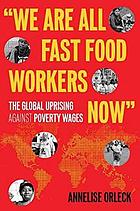
"We Are All Fast-Food Workers Now"
The Global Uprising Against Poverty Wages
کتاب های مرتبط
- اطلاعات
- نقد و بررسی
- دیدگاه کاربران
نقد و بررسی

February 15, 2018
Orleck (history, Dartmouth Coll.; Storming Caesars Palace) presents a fast-paced and passionate look at cooperative efforts by workers around the world to break out of their low-wage status and receive recognition and compensation for the difficult tasks they do. Although the title might lead readers to believe this is solely a discussion of the status of fast-food workers, this book goes much farther in looking at the condition of people laboring in jobs with wages driven downward by their companies and an integrated and exploitative global economy. Focusing primarily on social and labor movements in the United States, South and Southeast Asia, and Latin America, Orleck draws on interviews with employees and organizers who are protesting working conditions. The author's approach is more emotional than analytical, presenting the case for these individuals through brief vignettes drawn from conversations with her subjects. This approach reveals Orleck's strong identification with and enthusiasm for their efforts. However, the presentation often appears scattershot, with an overall effective discussion being lost along the way. VERDICT This book will interest activists already sympathetic to these causes more than those seeking a dispassionate discussion of solutions to the serious problem of low-wage work.--Charles K. Piehl, Minnesota State Univ., Mankato
Copyright 2018 Library Journal, LLC Used with permission.

February 1, 2018
This is a well-documented introduction to unionization efforts by often marginalized, behind-the-scenes workers: fast-food servers, hotel housekeepers, garment workers, home-health-care aides, cashiers, airport employees, crop pickers, even adjunct professors. Orleck selects representative labor strugglessome already resolved with positive results, others just emergingfrom seven U.S. states and eight additional countries. The detailed narratives are sprinkled with statistics and quotes from employee interviews, revealing not only shared, universal desires such as respect, living wages, safe working conditions, and health-care benefits, but also unexpected, coincidental job-related hazards, such as two McDonald's workers, one from Brazil and one from Japan, who find identical griddle-burn scars on their arms. Some scenarios identify charismatic leaders who have become the voices for their communities and trace their personal struggles. Orleck believes that these success stories will inspire ever-increasing unionizing across similar occupations in additional locales and predicts that mass labor organization and international cooperation will shape the future global economy.(Reprinted with permission of Booklist, copyright 2018, American Library Association.)

























دیدگاه کاربران